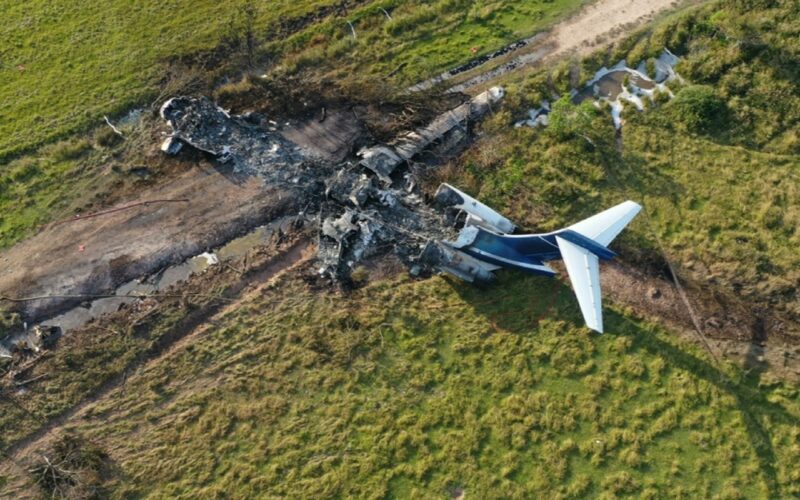The National Transport Safety Board (NTSB) has concluded that jammed elevators, plus the failure to implement preflight procedure, probably caused a McDonnell Douglas DC-9-87 to crash at Houston Executive Airport in October 2021.
The incident, which was widely covered by the world’s media, occurred when the Boeing MD-87 overran the departure end of runway 36 after the jet failed to pitch up.
The aircraft, operated by 987 Investments LLC, smashed through the airport’s perimeter fence, crossed a road and struck power lines before coming to a stop.
A fire then broke out, which ultimately destroyed the aircraft. However, all 19 passengers and four crew members were able to escape, though two of those onboard suffered serious injuries.
In the NTSB’s report, published on September 28, 2023, the agency said that the flight from Brookshire, Texas prepared to take off at about 10:00 am local time on October 19, 2021.
Passengers onboard were heading out to watch a baseball game in Boston.
As the plane traveled down the runway at takeoff speed, the captain pulled back on the control column to get airborne, but the plane did not respond.
The first officer called “abort” and the crew deployed thrust reversers and applied heavy braking, but the jet was moving too fast to stop on what remained of the runway.
The NTSB concluded that the jammed condition of both elevators resulted from “exposure to localized, dynamic high wind while the airplane was parked,” preventing the plane from rotating during the takeoff roll.
The previous investigation of a 2017 runway excursion accident in Michigan, involving another MD-80 series plane, also pointed to a jammed right elevator caused by exposure to dynamic high wind while the airplane was parked.
Following that investigation, the NTSB recommended that Boeing issue revised procedures designed to detect a jammed elevator condition during preflight inspections.
Boeing developed the recommended procedures, which were detailed in an operations bulletin that was sent to all MD-80 series airplane operators in May 2020.
The first officer who conducted the preflight inspection in Houston failed to follow the updated procedures that would have identified the jammed elevators simply because he was not aware of them.
The investigation found that the aircraft operator, Everts Air Cargo, had not downloaded the bulletin, nor were they aware of its contents.
The NTSB said that failure to implement that preflight procedure was also causal to the crash.

